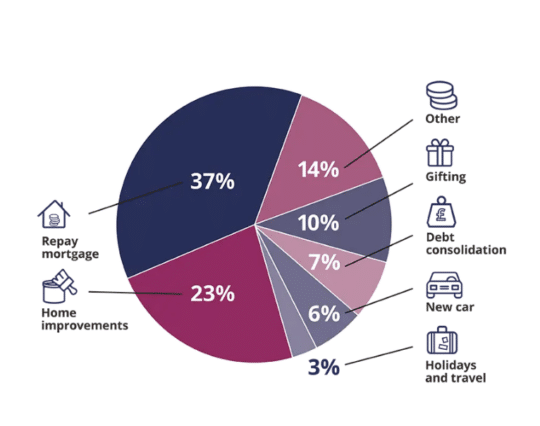Pros and Cons of Lifetime Mortgage
Our preferred equity release adviser is Age Partnership. For free and impartial money advice you can visit MoneyHelper.

Our preferred equity release adviser is Age Partnership. For free and impartial money advice you can visit MoneyHelper.
Are you thinking about getting a lifetime mortgage? You’ve come to the right place. Every month, over 7,000 people just like you visit our website to get clear advice on lifetime mortgages.
In this guide, we will:
- Explain what a lifetime mortgage is.
- Show how a lifetime mortgage works.
- Discuss the good and bad points of a lifetime mortgage.
- Tell you where to get a lifetime mortgage.
- Talk about what happens when a lifetime mortgage ends.
Did you know that last year, 51% of new lifetime mortgage customers used their funds mainly for home improvements to make their ‘forever homes’ better?1
If you’re considering a lifetime mortgage for similar reasons, it’s important to weigh its pros and cons before deciding.
Don’t worry, we’re here to help. Let’s find out more about lifetime mortgages together.
Regulation of Lifetime Mortgages
The Financial Conduct Authority regulates lifetime mortgage providers.
The FCA are responsible for ensuring that they are sold fairly with transparency and have specific rules and guidelines that must be followed.
Lenders must ensure that the borrower fully understands the costs of the lifetime mortgage option, including any fees and interest.
They also require lenders to provide the borrower with a no-negative equity guarantee.
This means that at the time the property is sold, if there are not enough funds to pay off the mortgage, their families cannot be held responsible for the shortfall.
Lifetime Mortgage Advantages and Disadvantages
When you receive equity release advice from a financial advisor or consultant, the pros and cons of using a lifetime mortgage should be fully explained to you.
It is mandatory to receive professional equity release advice as part of the application process. This is to ensure you know what you could be signing up for.
But it’s also essential to know the pros and cons of lifetime mortgages early by doing your own research – which is why you’re reading this guide.
So let’s get into them…
» TAKE ACTION NOW: Find out how much equity you could release
What are the pros of a lifetime mortgage?
The lifetime mortgage pros are:
- You can still get a loan in your latter years. Many loan providers won’t lend to people near retirement age or in retirement.
- The loan can be sizeable, up to 60% of your home’s current market value.
- There are no mandatory monthly repayments.
- You might only pay off the debt after you die.
- The loan can be used as you wish, such as for retirement planning.
It is important to ensure that the provider is a member of the Equity Release Council, previously known as SHIP.
The role of the Equity Release Council is to promote high standards of conduct and ethics in the equity release sector.
Guidelines include providing the borrower with clear information, including all risks associated with equity release.
They must also provide customers with impartial advice from a professional advisor and all products offered must have a no-negative equity guarantee.
What are the downsides of a lifetime mortgage?
The main downsides to a lifetime mortgage are:
- Some properties don’t qualify
- The debt can grow at a fast rate making it expensive to repay
- Exiting the loan early can be difficult due to early repayment charges
- You won’t be able to pass on your home, and the inheritance you leave behind will be much less valuable.
- You might not qualify for some means-tested benefits such as pension credits and housing benefits anymore. Although you might overcome this by choosing a drawdown equity release, it’s essential to consider the tax implications of your decision and its effects on your inheritance planning.
- The loan approval process includes fees, such as administration, valuation, legal, and interest charges. If you end your lifetime mortgage early, there could be early repayment charges.
How equity release could help
More than 2 million people have used Age Partnership to release equity since 2004.
How your money is up to you, but here’s what their customers do…
Find out how much equity you could release by clicking the button below.
In partnership with Age Partnership.
Is it worth getting a lifetime mortgage?
“My friends wince when I mention lifetime mortgages”

Source: https://forums.moneysavingexpert.com/discussion/2974692/lifetime-mortgage
This is how one forum user explained her experience considering a lifetime mortgage. And it’s not an uncommon scenario.
Lifetime mortgages have somewhat of a tarnished reputation due to some horror stories. But the industry and products have vastly improved over the last decade.
Ultimately, the decision to get a lifetime mortgage should be based on your needs and preferences while being fully aware of the pros, cons and long-term impact on your estate beneficiaries.
Before deciding on a lifetime mortgage, please consider the following steps.
- Do your research about the types of lifetime mortgages and how they work, weighing up the pros and cons of each option.
- Seek independent, professional financial planning advice from a qualified advisor or a mortgage broker who can help you find the best option for your circumstances.
- Consider the possible alternatives, such as downsizing or using any other savings.
- Research lenders carefully, making sure that they are registered with the FCA.
- Understand the fees and interest rates.
- Please review the terms and conditions, ensuring you fully understand them.
Are there any alternatives?
Yes, there might be alternatives to a lifetime mortgage for you, such as home equity loans or downsizing to create funds.
The alternatives available to you will depend on your circumstances, especially your age. Organisations such as the Citizens Advise Bureau may also provide helpful advise.
Your equity release adviser will discuss the lifetime mortgage alternatives that are available to you in your compulsory meeting.
Equity release comparison
When exploring equity release options such as lifetime mortgages, it’s important to consider alternatives as well.
Let’s take a closer look at another viable option: home reversion plans. Below, there’s a comparison table to help you evaluate both approaches effectively.
| Category | Home Reversion Plan | Lifetime Mortgage |
|---|---|---|
| Ownership of the Property | You will sell either a portion of or the whole value of the home and then be allowed to stay on the property as a tenant. The lender will become a co-owner. | When you take out the secured loan against the property, it will remain in your ownership until you pass/move into long-term care. |
| Change in Value of the Property | With a co-ownership, you will be directly impacted by the property’s value in current markets. This means that you could just as easily lose out on money in the case of a value decrease as you could benefit from an increase. | Since this loan is typically paid off by the sale of the property after passing/owner is moved into long-term care, the value of the home after this case may impact how much money will be left to the estate/family once it has been sold. |
| Inheritance | While some plans do offer a guaranteed inheritance amount, it is likely that the inheritance will be dramatically reduced because you’ve sold a large portion of the property. | Some lifetime mortgages allow for an inheritance protection scheme, but the overall inheritance amount is decided by the loan size and accrued interest. |
| Repayment | No repayment required during your lifetime. It will be paid back once the property is sold. | Some lifetime mortgages allow for partial, voluntary repayments during your lifetime. However, the majority of the loan will be paid back once the property is sold. |
| Type of Payment | There is a choice between a lump sum payment or a regular income with this loan. You can also choose a mixture of the two. | You can either receive a lump sum loan, or you can choose a drawdown facility which allows you to take out money whenever you need it. |

